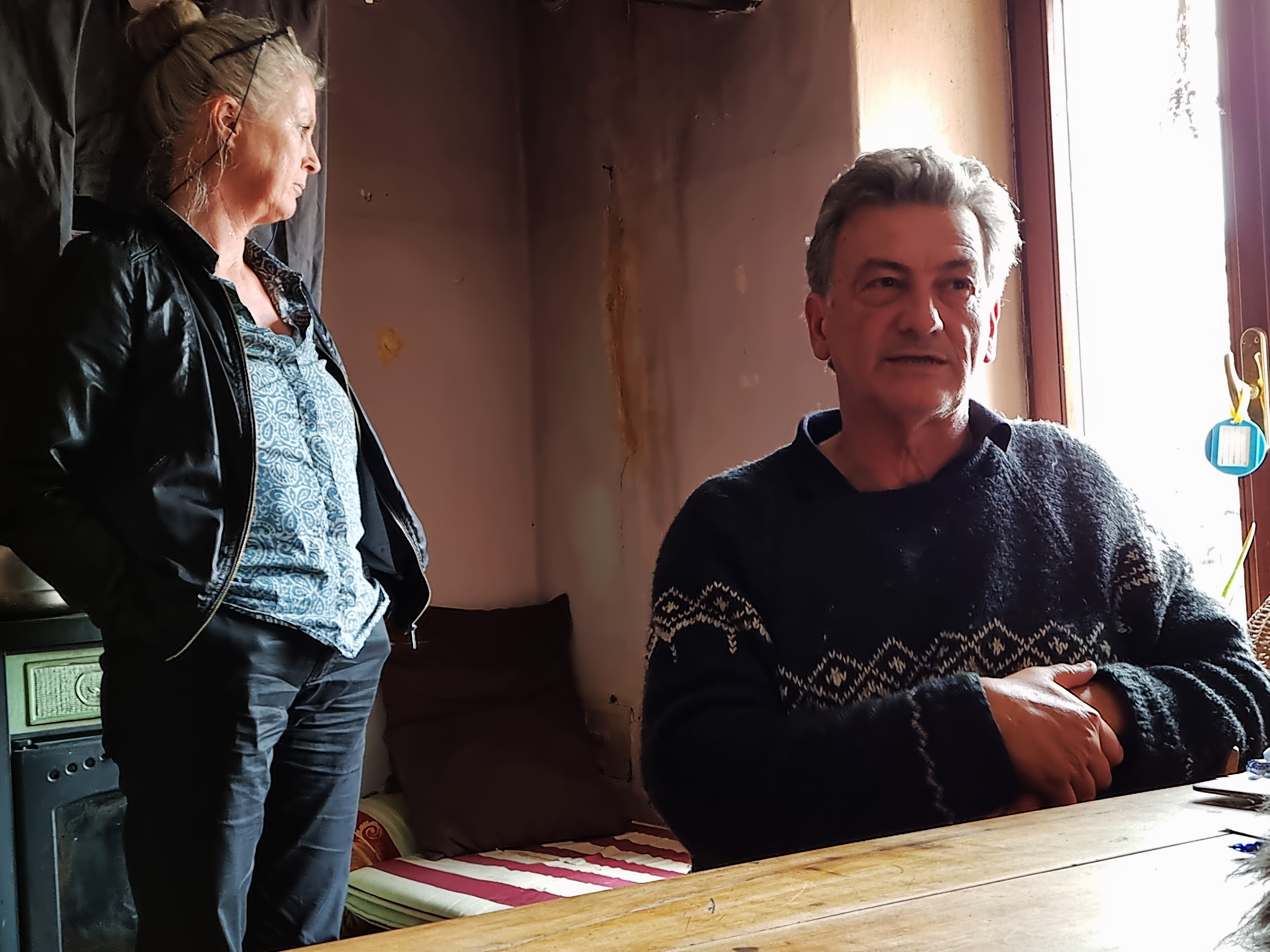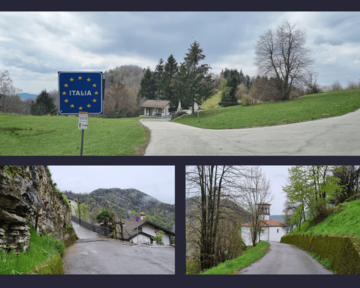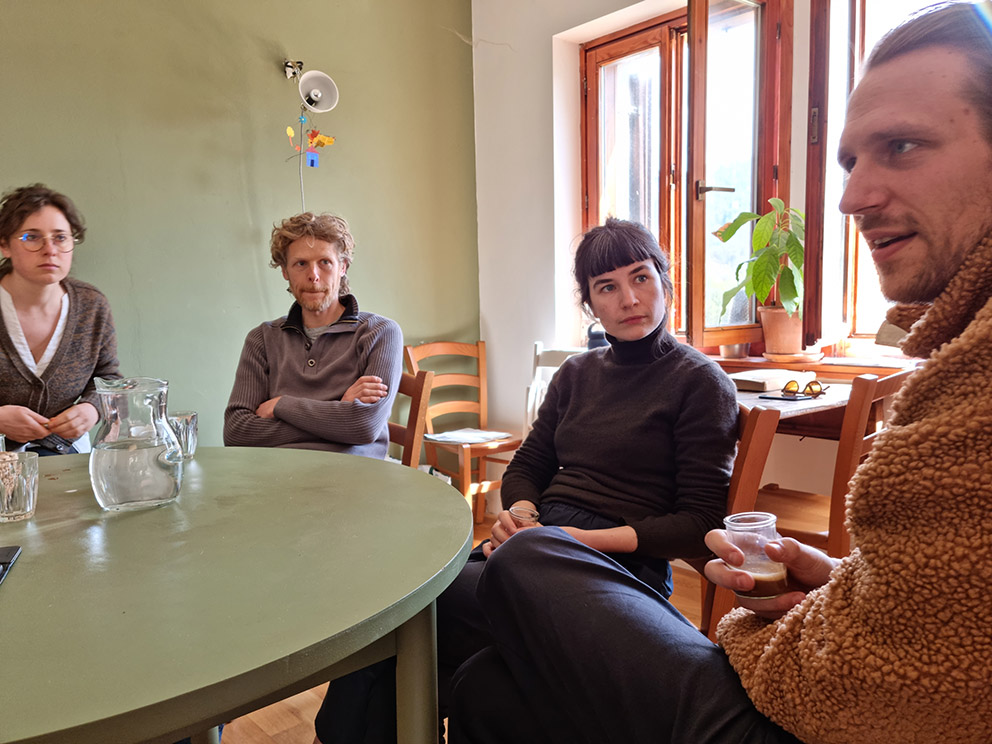
Antonella Bukovaz and Moreno Miorelli © Antonio Senter/OBCT
The end of the Station and new beginnings with the Robida collective, between nostalgia, mountain sobriety, and lucid enthusiasm: the second part of a reportage from Topolò, which never ceases to be a forge of cultural and life projects despite all the difficulties, including bureaucratic ones
(Read the first part of the reportage)
Some spoke of the end of a "cultural miracle", of the epilogue of a "wonderful adventure", and for many the news came out of the blue. In August 2022, when Moreno Miorelli and Antonella Bukovaz announced the closure of Stazione Topolò a few weeks before the 29th edition, the Friulian cultural and political scene, as well as the media and intellectuals from everywhere, mourned the end of an era.
And yet in the village, despite the profound differences, divergences, and generational distance, everyone seems to share the same matter-of-fact attitude, as if to escape cliches and the rhetoric of "promotion", "village that is reborn", and "suggestive scenery" for "sustainable tourism". “I won't deny that it was a painful choice – Moreno Miorelli tells us about closing thirty years of artistic events and above all musical workshops – but I really would not have been able to bear the rhetoric that was about to accompany the 30th anniversary. Really: there's room for more, and I wasn't willing to be that thing anymore”.
The people less than half his age, who for some time have been moving in cultural and planning activities on the same international horizon, show a similar view: "We must ask ourselves not only what we want for Topolò – argues Dora Ciccone, from the Robida collective – but above all what we don't want. And by this I mean a possible development in terms of tourism, which we know how many real risks actually entails".
The terms that those we met in Topolò would like to delete from the dictionary also include "passing the baton", "collecting the inheritance", and "generational relay". One experience ended, others were born: period. Thirty years of artistic events involved inhabitants and visitors, and ended: brooding is forbidden. There were big pages in national newspapers, several degree theses, important guests: we move on. And anyone who grew up in the alleys that in July came alive with voices from all over the world has taken some cues. But nothing more. “We have been nourished by the stimuli of the Station – confirm Dora Ciccone and Vida Rucli of the Robida collective – but we are also ready to go further, with our gaze, with the experiences that we may have gathered abroad, at university, across Europe". And in his own way Moreno agrees – he wanted the Station to vanish before the 30th anniversary, relieving young people of the burden of the relay. Better to make a clean sweep, better leave carte blanche.
However, some allow space for nostalgia. Donatella Ruttar, who for a few years shared the direction of the non-festival with Moreno, is explicit: "The Station was a time for the spirit, a time different from the rest of the year, a time for oneself, for nourishment ”. And obviously the owners of the houses in Topolò who, since 2000, had made the hotel available to guests, a set of apartments renovated thanks to European funds, are also quite bewildered. "Architect Renzo Rucli mobilised the owners to facilitate the bureaucratic part in the phase of participation in the tender – recalls Donatella – and in this phase he did everything for free, such was his dedication to the village, to which he had devoted books and research”.
Architecture, Europe – almost a dual concept which periodically makes its way back to Topolò. Like when more than twenty years later, in June 2022, the Robida collective won the first prize of the New European Bauhaus with the work of Janja Šušnjar, who reinterprets the structure of the village as a redistribution of spaces within a single dwelling. This is explained by Vida Rucli, who thought of nominating her friend's degree thesis for the European prize: “Janja lived here for several months, and she shared with us the difficulties of living in incomplete houses, where maybe there is no washing machine but there is Internet, where there is no shower but there is an oven”. The architectural idea becomes an urban design in which, as per tradition, the functions of living are shared and divided into different and distinct spaces between one house and another. The Village as a home – this is the title of the project that won the "Rising Stars" category in the "Give priority to places and people who need it most" – more than a working hypothesis, more than a theory, is the description of what has happened for centuries and reappears with the arrival of new residents in the town. “That's how we live”, Vida confirms with a smile. So does Dora, who at first did not have a bathroom in the house and had to go to the neighbour's to take a shower: "Of course, our return to the village is not without difficulties, but we have learnt to know them and to face them".
Living is the new mantra, but this stubborn resistance that does not want to succumb to time is also played on contrasts, and so Topolò moves between abandonment and international limelight, rekindling hopes and at the same time always remaining the same. Like in the nineties, when the first artists were hosted in the barns in July, but the number of residents was not increasing, or in the recent activities of the association which survived the closure of the Station, with the mapping of the paths supported by European funds. “We are trying to make sense of a landscape that has been devoured by the forest and has erased too many traces”, explains Antonella Bukovaz, poet and teacher, for years coordinator of the poetry section of Stazione Topolò: “We have collected testimonies, stories, memories, and in this way we want to redraw the map of the routes that until recently crossed a landscape made up of pastures”.
The young people of the Robida collective also concentrated their energies on the landscape: "We decided to shift the focus, which seemed to be limited to the village itself", explains Vida Rucli. Hence research, reflections, and conferences on the terraced landscape, but also collective cleaning and restoration operations; workshops, residencies, and theoretical contributions on living on the edge, a "topographic as well as cultural and identity edge", eventually defining Topolò as "the edge of the edge".
This could perhaps be that "space for other things" that Moreno mentioned when explaining how his stepping back without naming heirs was actually a drastic, yet generous act of subtraction. A bit like saying: "Come on next, now you do it". And the thirty-year-olds are really stepping forward, amidst enthusiasm and more than a few expectations.
Another project, supported by European funds through the Region, involves the rediscovery and analysis of forgotten toponyms. Architect Renzo Rucli, who in summer 1993 had introduced Moreno to the people of Topolò, facilitating the birth of the Station, now coordinates a young team of linguists and historians. Among those who will have to move in the woods and in the documents in search of morphological and written traces, there is also one of the members of the Robida collective, Aljaž Škrlep, born in 1993. With a master's degree in philosophy and Slovenian studies, the educator whom the others from Robida (mainly Italians from the Slovenian minority) call the "Slovenian Slovene", grew up in Nova Gorica, a town geographically on the border but in certain respects fully Slovenian: "I had never felt as if I lived on the border, on the contrary; instead, since I've been in Topolò, I've felt my curiosity emerge for my cross-border nature and for everything that has to do with the border”.
Topolò effect. A few hundred metres from the Italian-Slovenian border. Where the first living being you meet arriving in the village going up from Clodig is a salamander, or rather two, or rather three. Unequivocal sign of the healthiness of the waters.
Il reportage da Topolò include anche:
This content is published in the context of the "Work4Future" project co-financed by the European Union (EU). The EU is in no way responsible for the information or views expressed within the framework of the project. The responsibility for the contents lies solely with OBC Transeuropa. Go to the "Work4Future"


























 To Top
To Top